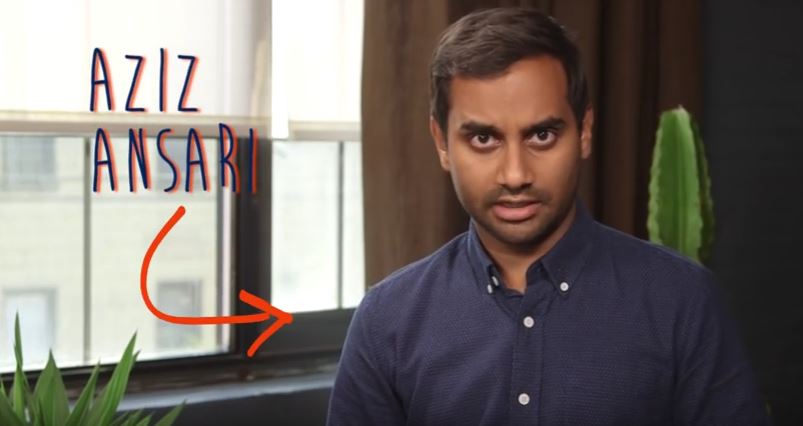
by Lakshmi Gandhi & Asha Sundararaman
The following post was originally published via Tinyletter.com and republished here with permission.
Lakshmi: Recently, we saw two very different voter PSAs from two very different Muslim-Americans. The first was from Gold Star dad Khizr Khan and was done for Hillary for America and the second was for an environmental group and was done by Aziz Ansari.
Asha, can we talk about how blown away we were by the Khan spot?
Asha: So powerful. The Clinton campaign really knows how to tug at the heartstrings.
Lakshmi: It was also just a beautiful piece of filmmaking.
Asha: It really was.
Lakshmi: You could see Mr. Khan’s grief and it was touching to get a glimpse inside their home. It’s amazing that one day children will be reading about the time a Presidential candidate took it upon himself to repeatedly insult the parents of a military hero.
Asha: I can only imagine how they must feel.
Lakshmi: The Washington Post summed up the message of the ad perfectly:
“It’s a remarkably powerful ad, connecting Trump’s rhetoric on Muslims to the real pain that such a pledge would inflict on Muslim Americans. Real people would be affected by all of these proposals, the ad reminds us. It’s not just words by Trump.”
Asha: Real people are already affected.
Lakshmi: That’s true. My heart breaks a little every time I see something on Twitter about little Muslim kids asking their parents if they’ll have to leave the US after the election. Or when I read about Hispanic kids being taunted about deportation. This isn’t a game.
Asha: It really isn’t, he’s playing into the fear of “the other” that some people have.
Lakshmi: It’s similar to what we saw in the rhetoric used during the Hindutvaganza. He’s hoping that people’s fear will completely lead their decision making. (This is also a sign that he knows he is losing. Any time you try to appeal to people’s basic instincts, you know you don’t have the policy positions or numbers to win.)
But this NYT article really brings the impact of this rhetoric home. Here’s what a little Muslim girl recently told her dad:
“Baba, I had a scary dream,” she said, hugging him tight. “About Donald Trump.”
“He was so mean to us,” she said. “He had a scary face, like a zombie or something.”
She’s right. He does have a scary face!
Asha: Hahaha, he really does. But I think that’s what happens when you are a terrible person.
Lakshmi: Yes! But one interesting part about that NYT article (which features several Muslim families who live in Staten Island) was that some of them said that they pulled their children out of the public school system and put them in private Islamic schools in order to keep them safe.That’s also an unintended consequence of racist rhetoric. More self-segregation and deeper religiosity.
Asha: Agreed. I think we see that a lot through history.
Lakshmi: I also wanted to mention that while Hillary is carefully courting American Muslim communities, many people gave her the side-eye for her comments at the debate on how Muslim-Americans should be “the eyes and ears” of the fight against terrorism.
Asha: It’s also funny because it’s really White Americans that should be looking out for terrorist activity since white men are most likely to commit terrorist acts in America.
Lakshmi: As we recently saw in the thwarted attack on Kansas City’s Somali community. But I don’t see why mass shooting by white men isn’t considered terrorism. Being shot to death at a mall while shopping, for example, should be considered terrorism regardless of who committed the crime.
Asha: Agreed. I think part of the problem is that the people in power can see themselves and their relatives in those men and they don’t want to be associated with it.
Lakshmi: So they say things like ‘He was just a lost soul! His wife left him! He might have a mental illness’ blah. blah. blah.
Let’s move on to something lighter. Aziz Ansari also did a get out the vote ad. Even though this one was technically nonpartisan (I believe), it was a pretty sharp critique of Trump.
[Read Related: Aziz Ansari’s ‘Master Of None’ is a Smart, Real and Hilarious Triumph]
Asha: I love that you call that lighter.
Lakshmi: Well, it was funnier! And it starts out as a funny spot on undecided voters before it takes a turn.
Asha: It is pretty funny and I love his frustration about undecided voters. Also, that he notes that other people who have done voting PSAs are way more famous.
Lakshmi: It also represents an evolution of sorts for him that started happening over the last few years. Remember when Aziz first became famous and he’d politely decline questions asking about Indian or Muslim identity?
Asha: I don’t actually!
Lakshmi: When “Parks and Rec” first started he’d just not comment much when asked about being an Indian-American celeb, and say there are better-qualified people to speak on that.
Asha: Huh, interesting.
Lakshmi: He’d also make it a point to say that he’s not religious (which he’s still not), but I think that with the way the national conversation is going, a lot of people who wouldn’t normally talk about these things feel compelled to speak out. I still think fondly of his tweetstorm to Rupert Murdoch about American-Muslims.
Asha: I think you’re probably right, especially with racism and Islamophobia being such a big part of this campaign season.
Lakshmi: Right, like his tweets Murdoch were basically, ‘my mom and dad are in rural S. Carolina, what exactly do you want them to do?’ And that’s totally valid question that relates to those questionable Hillary quotes we mentioned earlier.
Asha: Right, it’s like you know, if you want people not to radicalize, then providing space for them to not get shit on for just existing is an excellent start.
Lakshmi: I also thought Aziz’s dismay at the existence of undecided voters was so relatable. Hillary is SO far from perfect.
But “There’s a fucking guy running that says he hates brown people! That’s not enough?!” is something I’ve wanted to scream many, many times.
Asha: You can’t spend 30 plus years in politics and be perfect. It’s just not a thing. Also be a white woman in America in politics and be perfect, that’s not a thing either.
Lakshmi: And the other guy hates us! That needs to be said and discussed. He pretends to certain (Hindu) Indians because he wants that New Jersey money, but I still can’t believe anyone fell for that.
Asha: Exactly! Did you see Roy Wood Jr’s Daily Show segment on black undecided millennials?
Lakshmi: I did see it! I’m a big Roy Wood Jr. fan. And I was equally incredulous as I heard his focus group explain why they didn’t like Hillary. I know Hillary is a hawk. I know Bill (to put it kindly) has been a horrible person in his personal life. Still, they aren’t going to break the country.
Asha: So true.
Lakshmi: It was also interesting that Aziz’s line about brown people was in an ad produced by a climate change group. There wasn’t one question about global warming in any of the three debates! And it’s the most pressing issue of our time.
Asha: Yeah, it’s weird that that’s not something they’re talking about. I guess they don’t think it’s a hot-button issue
Lakshmi: I honestly feel my anxiety go up on extremely warm days. Like last week it was 75 degrees in October here in NYC and I felt extra antsy. I asked around and that’s not uncommon!
Asha: Interesting, I didn’t know that!
Lakshmi: My therapist said it might be because it literally reminds you that the Earth is being destroyed and we’re all going to die. Fun times!
Asha: HAAA. Well, that’s comforting. Speaking of warming, maybe we should talk about Ivanka Trump preparing to celebrate Diwali.
Lakshmi: Yes! I was so confused by that! Ivanka will be heading to a Hindu temple in Virginia to participate in Diwali celebrations. It continues to baffle me that the Trump campaign is focusing so much energy on a tiny sliver of Hindu voters. I mean, they want money, probably. But still, it’s very odd.
Asha: It’s probably about money. Who is still supporting him? He seems to be in a downward spiral and Ivanka’s company is losing money as people boycott.
Lakshmi: It also feeds into the, “I don’t hate brown people. See? Indians are the good ones,” vibe that we got during the Hindutvaganza.
Asha: Maybe it’s because Hindu traditions are less scary? I mean really, no one can hate Diwali. It involves diyas [lamps] and food and mandalas.
Lakshmi: Yes, it’s a fun holiday if you are going to pick a celebration you don’t know anything about to parachute into!
Oh, since certain people seem to think we never say anything nice about India, let’s loop back to the climate change discussion and end by saying that we were both very happy that India decided earlier this month to participate in the Paris Agreement. Maybe we won’t bake to death after all!
“The Paris agreement requires all countries who ratify it to come up with a national plan to limit global temperature rise, and as part of its plan India has set a goal of producing 40 percent of its electricity with non-fossil fuel sources by 2030.”
Asha: So exciting!
Lakshmi: And hopefully other countries will follow suit!
Asha: I can think of many Indian villages that would benefit from this. Hopefully, that will translate into jobs outside India’s urban areas.
Lakshmi: Fingers crossed.
 Lakshmi Gandhi is a journalist and pop culture writer based in New York. Her work has appeared in Metro New York, NBC Asian America and NPR’s Code Switch blog, among other sites. She likes it when readers tweet her @LakshmiGandhi with their thoughts on Asian American issues and romance novels.
Lakshmi Gandhi is a journalist and pop culture writer based in New York. Her work has appeared in Metro New York, NBC Asian America and NPR’s Code Switch blog, among other sites. She likes it when readers tweet her @LakshmiGandhi with their thoughts on Asian American issues and romance novels.
 Asha Sundararaman is a freelance writer and photographer based in Oakland, California. When she’s not discussing pop culture, she can be found in her kitchen blending the flavors of her Southern and Indian roots.
Asha Sundararaman is a freelance writer and photographer based in Oakland, California. When she’s not discussing pop culture, she can be found in her kitchen blending the flavors of her Southern and Indian roots.




